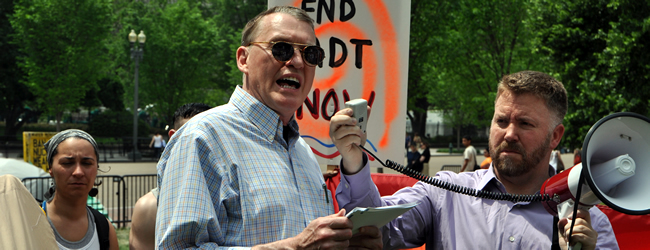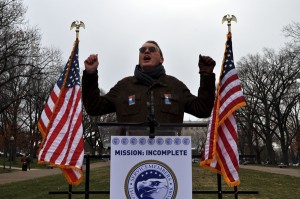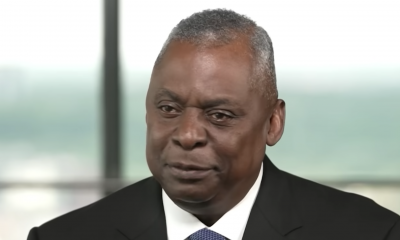National
Gay sex remains a crime under military law
‘Don’t Ask, Don’t Tell’ repeal leaves sodomy ban unchanged


Aubrey Sarvis, executive director of SLDN, said his group’s top priority this year is to secure the certification by President Obama and military leaders for completing repeal of ‘Don’t Ask, Don’t Tell.’ (Washington Blade file photo by Michael Key)
Much of the nation was riveted over the drama surrounding the congressional vote last month to repeal the “Don’t Ask, Don’t Tell” law barring gays from serving openly in the military.
But in a little-noticed development, Capitol Hill observers say Congress is in no mood to take a follow-up action recommended by Pentagon officials — the repeal of a longstanding military law that classifies consensual sodomy among both gay and straight service members as a crime.
Gay rights attorneys and experts in military law say the sodomy law provision known as Article 125 of the Uniform Code of Military Justice has been rarely enforced in recent years in cases where sexual activity has been consensual and “fraternization” between officers and lower ranking members has not be a factor.
And the experts say a 2004 decision known as U.S. v. Marcum by the U.S. Court of Appeals for the Armed Services placed limits on the enforcement of Article 125 based on a U.S. Supreme Court decision one year earlier that declared state sodomy laws unconstitutional.
Yet because the military court did not overturn Article 125, its characterization of gay sex as criminal acts punishable by court martial will remain on the books until Congress repeals the statute, leaving in place what some activists say is an unfair stigma associated with gays and lesbians in the military.
Gay rights attorneys have said the Supreme Court could overturn the military sodomy law by affirming that the Lawrence v. Texas decision fully covers the military. But it could take years before a new military case reaches the high court.
Aubrey Sarvis, executive director of the Servicemembers Legal Defense Network, which has led efforts to repeal “Don’t Ask, Don’t Tell,” said his group’s top priority this year is to secure the certification by President Obama and military leaders for completing repeal.
The repeal law passed by Congress and signed by President Obama in December doesn’t allow full repeal to take effect until the president, the Secretary of Defense and chair of the military’s Joint Chiefs of Staff determine troops and commanders are fully prepared for the change.
“So I would say no, that our top priority for this Congress is not the repeal of Article 125,” Sarvis told the Blade. “Do I think it should be repealed? Yes. Has SLDN been working over the last several years for repeal? Yes.”
Among those agreeing with Sarvis’ assessment is gay U.S. Rep. Barney Frank (D-Mass.).
“I’m skeptical and frankly at this point I don’t think it’s a good idea to press ahead with that one,” Frank said Tuesday, noting that gay rights opponents would likely use a debate on sodomy repeal in the military to push “hidden agendas.”
Sarvis summarized the views of other LGBT advocates when he said the Republican-controlled House would almost certainly refuse to even consider a bill to repeal Article 125. He said the need for pushing other LGBT-related issues in the military and other areas outweighs expending resources on Article 125.
Although Article 125 applies to gays and straights alike, gay rights advocates have said military authorities used it to target gay and lesbian service members in the past, especially in the years prior to “Don’t Ask, Don’t Tell.” If it remains on the books, some wonder whether a future president less supportive of LGBT rights might reinstate its full enforcement.
Longtime D.C. gay rights leader Frank Kameny, who assisted gay service members in the 1970s and 1980s, long before SLDN and other LGBT rights groups existed, said military investigators waged what he and other activists called “witch hunts” to identify and discharge gays on grounds that they violated Article 125.
Under Article 125, “any person subject to this chapter who engages in unnatural carnal copulation with another person of the same or opposite sex or with an animal is guilty of sodomy. Penetration, however slight, is sufficient to complete the offense,” the article states.
Under the 2008 version of the military’s official manual for courts martial, unnatural carnal copulation under Article 125 is defined as a person taking into his or her “mouth or anus the sexual organ of another person or of an animal…or to have carnal copulation in any opening of the body, except the sexual parts, with another person.”
Sarvis and Aaron Belkin, director of the Palm Center, an arm of the University of Southern California that studies issues related to gays in the military, each said they know of almost no cases in recent times where service members, gay or straight, have been prosecuted under Article 125 for engaging in consensual sex in private.
The two noted that nearly all Article 125 prosecutions in recent years have involved additional infractions and violations, such as allegations of rape or sexual harassment or of sexual activity between an officer and a lower-ranking enlisted person.
The latter category of cases, known as fraternization, is considered a strong breach of military rules because sexual relations between an officer and a subordinate are believed to harm the system of order and discipline deemed important in the military.
Bridget Wilson, a San Diego attorney in private practice who has represented gay and lesbian service members for more than 20 years, said she agrees with Sarvis and Belkin’s assessment about the infrequency of Article 125 enforcement in recent years for consensual sex.
But Wilson said the pressure that “Don’t Ask, Don’t Tell” has placed on gay and lesbian service members to conceal their sexual orientation during the 17 years it has been in effect has led to many cases where service members “fabricate” a non-consenting allegation to protect themselves from being thrown out of the service.
If a service member ensnared in an investigation over alleged acts of sodomy admitted to having consented to such acts, Wilson said, it was equivalent to an admission to being gay and grounds for an automatic discharge under “Don’t Ask, Don’t Tell.”
“What I do see is false accusations of assaults,” she said in describing some cases faced by her clients. “You get a lot of, ‘I was so drunk last night I don’t remember a thing’ after he gets busted for having sex with another man.”
According to Wilson, some military prosecutors have interpreted impairment on the part of a service member due to alcohol consumption as a sign that the service member could not give true “consent” to a sexual act.
“So the problem with ‘I was so drunk that I don’t remember a thing’ is it could convert from [consensual] sodomy into forced sodomy with very serious consequences in the criminal courts,” she said.
With the repeal of “Don’t Ask, Don’t Tell,” Wilson said she is hopeful that the perceived need by frightened service members to fabricate a non-consenting sex allegation to avoid being discharged from the service will become a thing of the past.
She said military authorities notoriously handled similar cases with straight couples engaging in alleged sodomy differently because there is no “straight” version of “Don’t Ask, Don’t Tell.”
“They might find themselves punished by losing a stripe or losing leave time—that sort of thing,” Wilson said. “For my same-sex clients, before ‘Don’t Ask, Don’t Tell’ goes away, they’re out. They’re gone. And they’re probably facing administrative separation with an other-than-honorable discharge.”
In its widely publicized Nov. 30 report, the Pentagon’s Joint Service’s Committee consisting of top military leaders — which recommended the repeal of ‘Don’t Ask, Don’t Tell’ — also called on Congress to repeal Article 125.
The committee report points to both the U.S. v. Marcum decision, which limits the enforcement of Article 125, and the Lawrence v. Texas ruling that declared state sodomy laws unconstitutional as they pertain to consenting adults in the privacy of the home.
“In light of these decisions, we recommend that Article 125 be repealed or amended to the extent it prohibits consensual sodomy between adults, regardless of sexual orientation,” the report says.
“The other prohibitions considered punishable under Article 125, including forcible sodomy, sodomy with minors and sodomy that is demonstrated to be ‘service discrediting’ (i.e., in public or between a superior and subordinate), should remain on the books,” the report says.
Michael Cole-Schwartz, a spokesperson for the Human Rights Campaign, said HRC favors a prompt repeal by Congress of Article 125. He said the group also disagrees with the military court decision upholding Article 125 under some circumstances and feels the Supreme Court’s Lawrence decision, which overturned state sodomy laws, should also cover the military in its entirety.
“HRC expects that post-DADT repeal, Article 125 would only be used in circumstances involving non-consensual acts, so there should be no negative impact on gay and lesbian service members,” Cole-Schwartz said.
Former Army Lt. Dan Choi, who emerged as one of the nation’s most visible opponents of “Don’t Ask, Don’t Tell” after being discharged under the statute, said he recognizes that Congress is unlikely to repeal Article 125 any time soon. But he criticized SLDN and other LGBT groups for not being more aggressive in pushing for its repeal at the present time.
“Leaders [should] do what is important and difficult and lead,” he said.
Bryan Thomas, a spokesperson for Sen. Carl Levin (D-Mich.), chair of the Senate Armed Services Committee, said Senate Democratic leaders were reviewing the Pentagon report’s call for Congress to repeal Article 125. He said a Senate repeal measure would most likely be introduced as an amendment to the National Defense Authorization Bill, but he had no further details by press time on whether or when such a measure would be introduced.
“We expect the administration to submit a legislative proposal for repeal or revision of Article 125 of the UCMJ, and such a proposal would certainly be carefully considered by the committee,” Thomas said.
Spokespersons for Republican and Democratic leaders in the House and Republican leaders in the Senate could not be immediately reached.
State Department
HIV/AIDS activists protest at State Department, demand full PEPFAR funding restoration
Black coffins placed in front of Harry S. Truman Building

Dozens of HIV/AIDS activists on Thursday gathered in front of the State Department and demanded the Trump-Vance administration fully restore President’s Emergency Plan for AIDS Relief funding.
Housing Works CEO Charles King, Health GAP Executive Director Asia Russell, Human Rights Campaign Senior Public Policy Advocate Matthew Rose, and others placed 206 black Styrofoam coffins in front of the State Department before the protest began.
King said more than an estimated 100,000 people with HIV/AIDS will die this year if PEPFAR funding is not fully restored.
“If we continue to not provide the PEPFAR funding to people living in low-income countries who are living with HIV or at risk, we are going to see millions and millions of deaths as well as millions of new infections,” added King.
Then-President George W. Bush in 2003 signed legislation that created PEPFAR.
The Trump-Vance administration in January froze nearly all U.S. foreign aid spending for at least 90 days. Secretary of State Marco Rubio later issued a waiver that allows the President’s Emergency Plan for AIDS relief and other “life-saving humanitarian assistance” programs to continue to operate during the freeze.
The Washington Blade has previously reported PEPFAR-funded programs in Kenya and other African countries have been forced to suspend services and even shut down because of a lack of U.S. funding. Two South African organizations — OUT LGBT Well-being and Access Chapter 2 — that received PEPFAR funding through the U.S. Agency for International Development and the Centers for Disease Control and Prevention in recent weeks closed down HIV-prevention programs and other services to men who have sex with men.
Rubio last month said 83 percent of USAID contracts have been cancelled. He noted the State Department will administer those that remain in place “more effectively.”
“PEPFAR represents the best of us, the dignity of our country, of our people, of our shared humanity,” said Rose.
Russell described Rubio as “ignorant and incompetent” and said “he should be fired.”
“What secretary of state in 90 days could dismantle what the brilliance of AIDS activism created side-by-side with George W. Bush? What kind of fool could do that? I’ll tell you who, the boss who sits in the Harry S. Truman Building, Marco Rubio,” said Russell.

U.S. Military/Pentagon
Pentagon urged to reverse Naval Academy book ban
Hundreds of titles discussing race, gender, and sexuality pulled from library shelves

Lambda Legal and the Legal Defense Fund issued a letter on Tuesday urging U.S. Defense Secretary Pete Hegseth to reverse course on a policy that led to the removal of 381 books from the Nimitz Library of the U.S. Naval Academy in Annapolis, Md.
Pursuant to President Donald Trump’s executive order 14190, “Ending Radical Indoctrination in K-12 Schooling,” the institution screened 900 titles to identify works promoting “diversity, equity, and inclusion,” removing those that concerned or touched upon “topics pertaining to the experiences of people of color, especially Black people, and/or LGBTQ people,” according to a press release from the civil rights organizations.
These included “I Know Why the Caged Bird Sings” by Maya Angelou, “Stone Fruit” by Lee Lai, “The Hate U Give” by Angie Thomas, “Lies My Teacher Told Me: Everything Your American History Textbook Got Wrong” by James W. Loewen, “Gender Queer: A Memoir” by Maia Kobabe, and “Democracy in Black: How Race Still Enslaves the American Soul” by Eddie S. Glaude, Jr.
The groups further noted that “the collection retained other books with messages and themes that privilege certain races and religions over others, including ‘The Clansman: A Historical Romance of the Ku Klux Klan’ by Thomas Dixon, Jr., ‘Mein Kampf’ by Adolf Hitler, and ‘Heart of Darkness’ by Joseph Conrad.
In their letter, Lambda Legal and LDF argued the books must be returned to circulation to preserve the “constitutional rights” of cadets at the institution, warning of the “danger” that comes with “censoring materials based on viewpoints disfavored by the current administration.”
“Such censorship is especially dangerous in an educational setting, where critical inquiry, intellectual diversity, and exposure to a wide array of perspectives are necessary to educate future citizen-leaders,” Lambda Legal Chief Legal Officer Jennifer C. Pizer and LDF Director of Strategic Initiatives Jin Hee Lee said in the press release.
Federal Government
White House sues Maine for refusing to comply with trans athlete ban
Lawsuit follows months-long conflict over school sports in state

The Justice Department is suing the state of Maine for refusing to comply with President Donald Trump’s executive order banning transgender athletes from participating in school sports, U.S. Attorney General Pam Bondi announced on Wednesday.
DOJ’s lawsuit accuses the state of violating Title IX rules barring sex discrimination, arguing that girls and women are disadvantaged in sports and deprived of opportunities like scholarships when they must compete against natal males, an interpretation of the statute that reverses course from how the law was enforced under the Biden-Harris administration.
“We tried to get Maine to comply” before filing the complaint, Bondi said during a news conference. She added the department is asking the court to “have the titles return to the young women who rightfully won these sports” and may also retroactively pull federal funding to the state for refusing to comply with the ban in the past.
Earlier this year, the attorney general sent letters to Maine, California, and Minnesota warning the blue states that the department “does not tolerate state officials who ignore federal law.”
According to the Maine Principals’ Association, only two trans high school-aged girls are competing statewide this year. Conclusions from research on the athletic performance of trans athletes vis-a-vis their cisgender counterparts have been mixed.
Trump critics and LGBTQ advocates maintain that efforts to enforce the ban can facilitate invasive gender policing to settle questions about an individual athlete’s birth sex, which puts all girls and women at risk. Others believe determinations about eligibility should be made not by the federal government but by school districts, states, and athletics associations.
Bondi’s announcement marked the latest escalation of a months-long feud between Trump and Maine, which began in February when the state’s Democratic governor, Janet Mills, declined to say she would enforce the ban.
Also on Wednesday, U.S. Education Secretary Linda McMahon said the findings from her department’s Title IX investigation into Maine schools — which, likewise, concerned their inclusion of trans student-athletes in competitive sports — was referred to DOJ.
Earlier this month, the Justice Department pulled $1.5 million in grants for Maine’s Department of Corrections because a trans woman was placed in a women’s correctional facility in violation of a different anti-trans executive order, while the U.S. Department of Agriculture paused the disbursement of funds supporting education programs in the state over its failure to comply with Title IX rules.
A federal court last week ordered USDA to unfreeze the money in a ruling that prohibits the agency from “terminating, freezing, or otherwise interfering with the state’s access to federal funds based on alleged Title IX violations without following the process required by federal statute.”
-

 District of Columbia4 days ago
District of Columbia4 days agoFinal push to raise funds, fill D.C. hotels as WorldPride nears
-

 District of Columbia4 days ago
District of Columbia4 days agoReenactment of 1965 gay rights protest at White House set for April 17
-

 El Salvador2 days ago
El Salvador2 days agoGay Venezuelan makeup artist remains in El Salvador mega prison
-

 Maryland4 days ago
Maryland4 days agoFreeState Justice: Transgender activist ‘hijacked’ Moore’s Transgender Day of Visibility event












